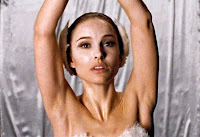 Never Let Me Go is a very thoughtful piece of work that makes you acutely aware of your existence. It's very easy, especially in youth, to forget that existence on this planet is terminable. It's the only way to truly live for we would drive ourselves crazy if we constantly concerned ourselves with death. It therefore creates a great deal of friction to be thinking about the impending doom of these characters, who are cloned only to have their organs harvested in early adulthood.
Never Let Me Go is a very thoughtful piece of work that makes you acutely aware of your existence. It's very easy, especially in youth, to forget that existence on this planet is terminable. It's the only way to truly live for we would drive ourselves crazy if we constantly concerned ourselves with death. It therefore creates a great deal of friction to be thinking about the impending doom of these characters, who are cloned only to have their organs harvested in early adulthood.
The whole time, I couldn't help but wonder why on earth the characters would not just run away? Once they knew their allotted purpose in life and once they left the preparatory school they grew up in, what kept them from running off into the world and establishing an alternate identification? It's rather clear that they, as clones, have the same feelings that "originals" have and the same need to find a place in the world so why would they conform to a system that suppresses everything.
They take pride in successfully donating, often measuring how well they have done after their first or second or even third donation (one thing that confused me is that it was never addressed which organs were being donated because in reality that would determine how many donations you survived). They worry about "completing," or dying, but don't seem to fight for living. It's not until the end when Kathy (Carey Mulligan) expresses that "we all complete" that I finally connected with the mentality that allowed these characters to accept their fate so willingly. It's true that we must all accept our inevitable death but personally I couldn't do that unless I knew I gave every shot I had at life.
A key objective for the characters becomes the desire to attain a deferral. The very goal of obtaining a "deferral," which would allow them to put off their organ donations until later in life, proves their want for more than what has been allotted to them. It's frustrating how there seems to be no hint of resistance.While this story probably comes off beautifully on the pages of a book, when you see the characters on screen it's more difficult to not scream for them to do something to fight back! It pains me to say that even Michael Bay's The Island took a similar premise and had its characters fight for survival (no, that doesn't make it a better film).
Never Let Me Go will have you contemplating your mortality in a very thoughtful manner. It's a very interesting coming of age story that for me is simply restrained by an inability to fully buy into the lack of a natural drive for survival. Then again, I suppose one can argue that the characters are clones and therefore don't behave entirely natural, but that's just making up explanations.
A key objective for the characters becomes the desire to attain a deferral. The very goal of obtaining a "deferral," which would allow them to put off their organ donations until later in life, proves their want for more than what has been allotted to them. It's frustrating how there seems to be no hint of resistance.While this story probably comes off beautifully on the pages of a book, when you see the characters on screen it's more difficult to not scream for them to do something to fight back! It pains me to say that even Michael Bay's The Island took a similar premise and had its characters fight for survival (no, that doesn't make it a better film).
Never Let Me Go will have you contemplating your mortality in a very thoughtful manner. It's a very interesting coming of age story that for me is simply restrained by an inability to fully buy into the lack of a natural drive for survival. Then again, I suppose one can argue that the characters are clones and therefore don't behave entirely natural, but that's just making up explanations.





